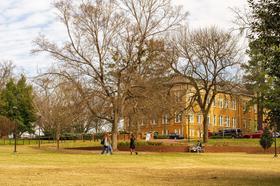Serving 316 students in grades Prekindergarten-5, Greenglade Elementary School ranks in the top 30% of all schools in Florida for overall test scores (math proficiency is top 30%, and reading proficiency is top 30%).
The percentage of students achieving proficiency in math is 60-64% (which is higher than the Florida state average of 52%). The percentage of students achieving proficiency in reading/language arts is 65-69% (which is higher than the Florida state average of 52%).
The student-teacher ratio of 14:1 is lower than the Florida state level of 17:1.
Minority enrollment is 97% of the student body (majority Hispanic), which is higher than the Florida state average of 65% (majority Hispanic).
Quick Facts (2026)
- Grades: Prekindergarten-5
- Enrollment: 316 students
- Student-Teacher Ratio: 14:1
- Minority Enrollment: 97%
- Overall Testing Rank: Top 30% in FL
- Math Proficiency: 60-64% (Top 30%)
- Reading Proficiency: 65-69% (Top 20%)
- Science Proficiency: 50-59% (Top 50%)
- Source: National Center for Education Statistics (NCES), FL Dept. of Education
Top Rankings
Greenglade Elementary School ranks among the top 20% of public schools in Florida for:
Category
Attribute
Reading/Language Arts Proficiency
Student Attention
School Overview
Greenglade Elementary School's student population of 316 students has declined by 15% over five school years.
The teacher population of 22 teachers has declined by 26% over five school years.
Grades Offered
Grades Prekindergarten-5
(No virtual instruction)
(No virtual instruction)
Total Students
316 students
Gender %
Total Classroom Teachers
22 teachers
School Calendar
School Rankings
Greenglade Elementary School ranks within the top 30% of all 3,662 schools in Florida (based off of combined math and reading proficiency testing data).
The diversity score of Greenglade Elementary School is 0.10, which is less than the diversity score at state average of 0.70. The school's diversity has stayed relatively flat over five school years.
Overall Testing Rank
#832 out of 3662 schools
(Top 30%)
(Top 30%)
Math Test Scores (% Proficient)
60-64%
52%
Reading/Language Arts Test Scores (% Proficient)
65-69%
52%
Science Test Scores (% Proficient)
50-59%
52%
Student-Teacher Ratio
14:1
17:1
American Indian
n/a
n/a
Asian
1%
3%
Hispanic
95%
37%
Black
1%
21%
White
3%
35%
Hawaiian
n/a
n/a
Two or more races
n/a
4%
All Ethnic Groups
Participates in the National School Lunch Program (NSLP)
Yes
Eligible for Free Lunch
51%
47%
Eligible for Reduced Lunch
3%
4%
School Statewide Testing
School District Name
Source: National Center for Education Statistics (NCES), FL Dept. of Education
Profile last updated: 02/09/2025
Frequently Asked Questions
What is Greenglade Elementary School's ranking?
Greenglade Elementary School is ranked #832 out of 3,662 schools, which ranks it among the top 30% of public schools in Florida.
What schools are Greenglade Elementary School often compared to?
Greenglade Elementary Schoolis often viewed alongside schools like Village Green Elementary School by visitors of our site.
What percent of students have achieved state testing proficiency in math and reading?
60-64% of students have achieved math proficiency (compared to the 52% FL state average), while 65-69% of students have achieved reading proficiency (compared to the 52% FL state average).
How many students attend Greenglade Elementary School?
316 students attend Greenglade Elementary School.
What is the racial composition of the student body?
95% of Greenglade Elementary School students are Hispanic, 3% of students are White, 1% of students are Asian, and 1% of students are Black.
What is the student-teacher ratio of Greenglade Elementary School?
Greenglade Elementary School has a student ration of 14:1, which is lower than the Florida state average of 17:1.
What grades does Greenglade Elementary School offer ?
Greenglade Elementary School offers enrollment in grades Prekindergarten-5 (No virtual instruction).
What school district is Greenglade Elementary School part of?
Greenglade Elementary School is part of Miami-Dade School District.
In what neighborhood is Greenglade Elementary School located?
Greenglade Elementary School is located in the West End neighborhood of Miami, FL. There are 49 other public schools located in West End.
School Reviews
5 10/10/2025
AWESOME SCHOOL!! WONDERFUL TEACHERS!! GREAT STAFF!!
my son went from 3rd to 5th grade and loved this school!
Review Greenglade Elementary School. Reviews should be a few sentences in length. Please include any comments on:
- Quality of academic programs, teachers, and facilities
- Availability of music, art, sports and other extracurricular activities
Recent Articles

Zero Tolerance Policies in Public Schools Today
An updated look at zero tolerance policies in public schools, including current trends, costs, legal concerns, and what parents need to know now.

The Pros and Cons of Tracking in Schools Today
Explore the advantages and drawbacks of academic tracking in today’s public schools, including equity, outcomes, and what parents should consider.

Budgeting Hidden Costs of Public Schooling in 2026
Learn how families budget for school lunch, after-school care, and activities, the hidden costs of public schooling in 2026.






